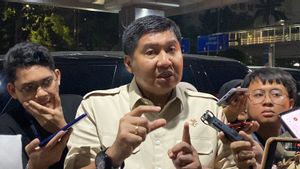JAKARTA - Secretary of the leadership of Indonesia Audit Watch (IAW) Iskandar Sitorus said in Law number 15 of 2006, it was stated that the sanctions for the Supreme Audit Agency (BPK) had been imposed so that it did not work.
He said there are several aspects that can be linked to legal or ethical consequences if the BPK does not carry out its duties and authorities properly.
"In Law (UU) number 15 of 2006 concerning the Supreme Audit Agency (UU BPK), there are several articles that regulate the authority of the BPK in auditing separated state finances, including state assets in BUMN/BUMD. The relevant articles related to this are article 6 paragraph (1), which states that BPK is tasked with examining the management and financial responsibility of the state carried out by the central government, local governments, other state institutions, Bank Indonesia, BUMN, BUMD, and other institutions or agencies that manage state finances," said Secretary of the Indonesian Audit Watch (IAW) Iskandar Sitorus to VOI in a written message received, Monday, February 24.
SEE ALSO:
"Furthermore, article 10 paragraph (1) states that the BPK has the authority to request information that must be given by everyone, units of central government organizations, local governments, other state institutions, Bank Indonesia, BUMN, BUMD, as well as other institutions or agencies that manage state finances. Article 11 stipulates that BPK conducts financial checks, performance checks, and checks with certain objectives on the management and responsibility of state finances," he added.
Meanwhile, article 23E paragraph (1) of the 1945 Constitution as the constitutional basis of the BPK firmly states that in order to examine the management and responsibility of state finances, a free and independent Supreme Audit Agency was held. This means that the BPK still has the highest authority in auditing state finances, including separated state assets. Including if the definition of separated state wealth is then replaced differently only by products at the level of law, added Iskandar Sitorus.
However, Iskandar was surprised why when the House of Representatives (DPR) processed the third amendment to Law number 19 of 2003 concerning State-Owned Enterprises (BUMN) in a plenary meeting on February 4, 2025, where the revision of the BUMN Law turned out to revise the definition of state finances that were separated into state money that was separated but no longer audited by the BPK but did not seem to be cooperative at all? This is a big question for the public. It can be seen that BPK members ignored the order of the 1945 Constitution.
"By allowing the DPR to revise the BUMN Law so that the definition of state money that is separated is different from that regulated in the 1945 Constitution and the BPK Law, then the BPK through the body filled by the leadership and the members of the seven members is clearly suspected of having committed actions that are not commendable in plain view. This agency must investigate who are the members of the BPK who are the main causes or at least triggers the "resistance of the BPK's authority through the birth of the definition of state money that is separated in the BUMN Law," while the BPK is silent," he said.
The English, Chinese, Japanese, Arabic, and French versions are automatically generated by the AI. So there may still be inaccuracies in translating, please always see Indonesian as our main language. (system supported by DigitalSiber.id)














